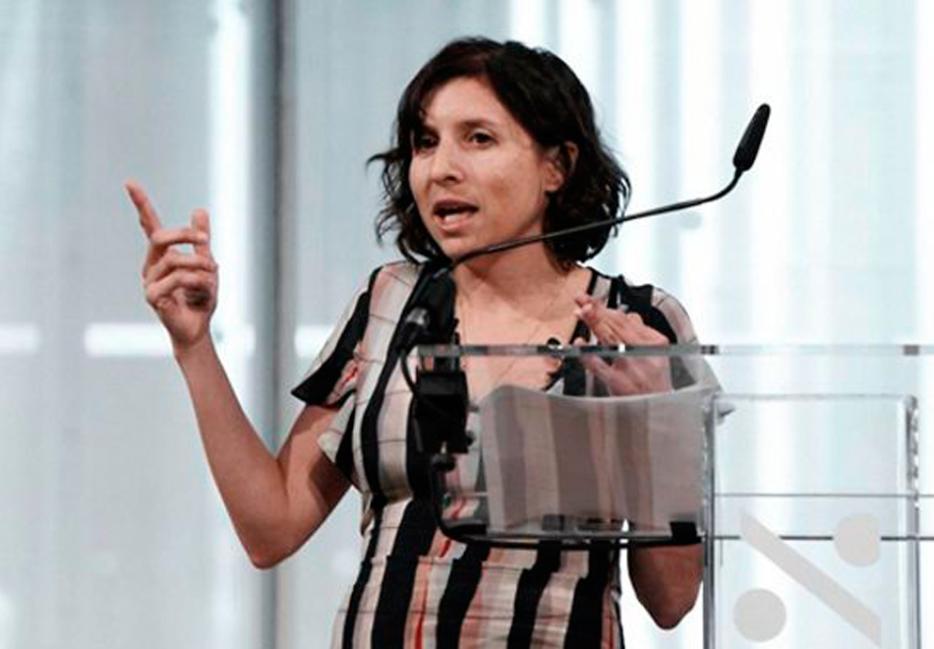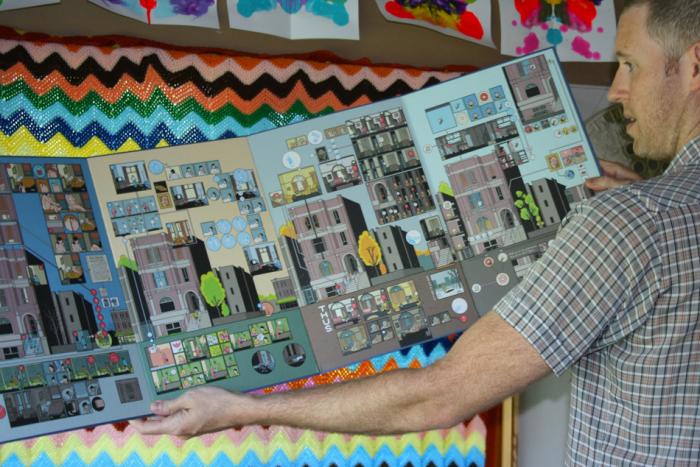This American Life is airing its 500th episode this week. To note the occasion, we’re profiling three of the show’s most notable contributors. The first is Starlee Kine, who has been on the show since nearly the beginning.
She’s told both wacky, shaggy dog stories—including one about staying in a potentially haunted hotel—and deeply heartfelt ones, such as The Break-Up. The story is one of the most popular in the program’s history. In it, Kine decided that, to move on from the end of a particularly significant relationship, she would write a torch song, and recruited Phil Collins for help. She ended up writing a simple, but heart rending piece, despite being unable to play an instrument. Kine is currently working on a book about the self-help industry.
Chris Berube: So you started as an intern, right? Or you contributed to the show before you were an intern.
Starlee Kine: I was on the show before I was an intern. I was just finishing up college and I did this video for this film and video class, a documentary about my neighbour, this crazy old lady who thought I was a drug kingpin. I used to have barbecues on my roof, and people would come over and you could watch the documentary I made about her and then go into the hall and see the real subject. And without fail you’d go into the hall and she’d open her door and shine a flashlight at you. Like, a haunted house-style person. I played it a lot. It got back to this man Paul Tough, a Canadian actually, who was also one of the founding consultants at the beginning of This American Life, so he did a story then about me and this neighbour.
Was radio on your radar at that time? Was it even thought of as a forum for young journalists?
No, no—maybe for young journalists, but not me. I didn’t grow up in an NPR-listening household. Most radio I knew was, like, the crazy lady next door who had her radio on all the time, so I associated the radio with crazy people. I didn’t go to school for journalism. There was this guy at the bookstore [I worked at] who would listen to This American Life, but he seemed sort of old-timey. But I knew the minute I met Paul that I wanted to work for it and be a part of it. I liked the sensibility of him and all that immediately. But then I heard the story, and had a hard time listening to it.
Why is that? Were you self-conscious about hearing your voice?
I don’t have that now—I can’t really watch myself on video, but I can listen to my stories. At the time, I’d never had anything featured on me and I guess I’d written personal things, but I just remember being incredibly embarrassed. I didn’t do a good job of reacting to it.
How did you learn how to tell a story?
This American Life is really good at stories. A lot of the early stuff, they would call it “the best dinner party anecdote you’ve ever heard.” I learned a lot watching how the other producers pitched stories. They always knew the ending. The pitches were always these amazing stories that you could listen to in the pitch meeting, and that was a really good education. I had gone to school for playwriting, screenwriting, and I feel like I learned nothing about stories from that, and everything about stories from This American Life.
I feel like storytelling wasn’t much of a thing at that point, anyway. People do it professionally now. People will call themselves professional storytellers and that’s a job you can have.
It’s just become so big. And I know that was a thing before, but I just think [David] Sedaris really started the contemporary version. There was like, Spalding Gray, obviously—all these people existed. But I wasn’t going to storytelling events when I was in college at all.
But there’s a pitfall to that, because now lots of people think they should tell stories, even if they don’t really have any. I’ve heard a lot that the personal talk about how the personal can be universal. People will say, “If I’m going through it, surely someone else is,” therefore, I should totally tell this as a story.
Well, I think there’s always somebody who’s going to relate to something. That is true. I had a friend who wrote about spending a very large sum of money on a boyfriend and buying a house and stuff, and then she got letters from people saying, “Oh, I did that too.” There is always somebody who’s going to relate. [But] universal means everybody will relate, and that is not true.
Obviously not everything is a story. I love comedians because I think comedians make things that aren’t stories work—they find these moments and they don’t have to worry about the arc. Good details do go a long way to make a story work, even if you don’t have a larger arc. And details can become jokes: Comedians can stick to these very specific things that are smaller and more everyday and it becomes universal, but I don’t know if it’s a story. A story needs to have an arc.
It seems like the way This American Life worked in the beginning, because it was always about anecdotes, which have a nice little arc built in.
In the beginning it was very anecdote-driven. Ira did create a sensibility out of thin air, but now it’s about such big subjects. The producers want it to keep changing, they want to keep the show interesting, they don’t want to become a formula or cliché of themselves. But also, all of those people that started out, we’ve told all our anecdotes now. We gave every single anecdote we have into the show. One piece I did, about the Reagan library, is amazing—I’m surprised that it happened so late, because I had been pitching it since the beginning.
That’s what I find interesting about David Sedaris, because he’s just written so many books now, you would think he would have exhausted all the anecdotes at this point, but even in his new book there are stories from his childhood. How does he have more?
I have no idea. There’s always a new Sedaris family member [who] will surface. He has siblings and maybe that helps jog his memory. I feel like I’ve got a few memories in my life and I’ve told them all. Everything else is gone. I remember so little. At this point my memory has calcified so much and it’s just turned into stories, and I’ve told them as stories, and there’s never a day when I’m like, “Oh yeah, I suddenly remember this happened.”
One issue for everyone who tells personal stories is to decide how much of your family to include. I remember one story you did where you tried to talk your dad into getting a divorce. Do you have any thoughts about those earlier stories now?
I’m writing a book that does have my family in it and I’m finding it much harder than a radio story, and as I get older I look back on some of the stories I did and I feel like I wouldn’t be able to do them now. Like, there’s something about being young and fearless and kind of stupid where you don’t understand the ramifications. I’m always careful with people I tell stories about and I try not to make them look bad unless I just walk into it. I don’t tell as many personal stories now, and I find it’s much harder, like I have a fear about it that I did not have when I was younger.
I know you’ve probably been asked about The Break-Up episode a lot. It’s maybe the most popular TAL episode ever. Do you feel like that story’s kind of followed you around a little bit?
Yes. It’s definitely the one that gets brought up the most. I always get excited when people bring up other ones. It’s just the one that people recommend to other people when they’re going through breakups—I’ve had people tell me that their therapist has prescribed that story for them.
Have you had people say they have tried to make art as a result of listening to that story? [In the story, Kine created a breakup song with help from Phil Collins and some Chicago-area musicians, despite having never played an instrument before.] What I get out of that story is that there is a catharsis in the act of creating something.
I would hope so. I feel like people have written breakup songs after listening to it and maybe that has helped them. But I think people like other things about the story—people like Phil Collins and they also like that I openly admit that I’m sad and that I’m wallowing. I think it gives them permission to feel sad for that time, and I guess that’s a surprising thing to hear. I think Phil Collins saying it also validates their feelings.
Did you ever hear from Anthony [her ex-boyfriend] about the episode or about the song?
I’ve never talked to him about it. I’ve only seen him like once on a subway after that. But I do know that he knows about it. People who know him have told me, and somebody a few years ago told me that he hadn’t listened. Something about that scenario, I just feel so right about it. I’ve talked to Phil Collins more about the story than I have to Anthony.
You’ve stayed in contact with Phil Collins?
He’s very famous, he’s very British… He’s living a different life. He’s a very wealthy person. I’ve read a couple people say it was because I was on This American Life and Phil Collins said yes because of that, but it really was not. He knew my friend and my friend is not a famous person, and I think he said yes to me because I was sad and he’s a great guy. I’m not kidding. It was not for his own glory, either, and I really respect that. Afterwards I emailed him and said, “I want to make sure you can hear it,” so we sent him a CD. He was not on the This American Life listening circuit, and I’ve tried to tell him how popular it is, but it’s always weird because I don’t want to say, “A lot of people will be like, ‘Oh, I love Phil Collins now.’” They should have always loved him. I used to send him emails every once in a while, and he always writes back and he’s super nice. We sold the story as a movie option and they wanted him to be in it, and I asked him and he said he’d retired from acting. He told me he liked it, in a way, that I have never heard from Anthony.
I love that point in the story where you ask Collins if he’d rather have the relationship or the song, and he says the relationship. It almost seems like you have to keep putting yourself in unusual experiences and do uncomfortable things to have stories. You have to keep putting yourself through stuff to have enough to continue making these things.
I wouldn’t have been able to do that story if I didn’t have a relationship. But also, I can never really talk about our breakup again. I have talked about it, I’ve told little things about the breakup inside other stories, but it also feels like, “Oh, that’s done.” People have kids, they start writing about their kids. People get divorced and they write about that. Louis CK, his show is all about his divorce. The most powerful stuff it seems is after that divorce, and things happen and then things felt bad.
You get more stories as you keep on living.
Yeah.
This transcript has been edited for brevity and clarity.






